
A recent case-control study published in JAMA Otolaryngology-Head & Neck Surgery found that chronic sinus inflammation was associated with alterations in brain networks, which could lead to cognitive dysfunction (1).
Chronic rhinosinusitis (CRS) is a multifactorial inflammatory condition affecting 5% to 12% of individuals (2). Patients report reduced quality of life relating to symptoms that extend beyond the sinuses, including fatigue, anxiety, depression, reduced sleep, and cognitive dysfunction (3,4,5,6).
To date, the biological mechanisms for cognitive dysfunction in CRS have not been elucidated. However, previous investigations of inflammatory and autoimmune diseases have identified aberrant functional connectivity ![]() in regions of the brain associated with cognitive control and stimulus detection (7,8,9).
in regions of the brain associated with cognitive control and stimulus detection (7,8,9).
In the current study, researchers utilised resting-state functional magnetic resonance imaging (fMRI ![]() ) data extracted from the Human Connectome Project to examine functional connectivity in healthy adults aged 22 to 35. From radiology image scans, researchers identified 22 adults with moderate or severe sinus inflammation and 22 age- and gender-matched adults with no sinus inflammation for comparison.
) data extracted from the Human Connectome Project to examine functional connectivity in healthy adults aged 22 to 35. From radiology image scans, researchers identified 22 adults with moderate or severe sinus inflammation and 22 age- and gender-matched adults with no sinus inflammation for comparison.
Secondary outcomes of the study included assessments of cognitive function, sleep quality, and sensation (olfaction, taste, and pain).
Compared with healthy controls, individuals with sinus inflammation showed decreased functional connectivity within the frontoparietal network, which is a major functional hub for modulating cognition, maintaining attention and problem-solving.
Furthermore, these individuals had greater connectivity of this region to the default mode network (areas of the brain that influence introspection and are active during mind-wandering and wakeful rest), and decreased connectivity to the salience network (areas of the brain involved detecting and responding to stimuli, social behaviour, and communication).
The magnitude of these differences in functional connectivity increased with inflammation severity.
Despite changes in functional connectivity, statistical analysis did not identify any significant between-group differences in cognitive assessments, self-reported sleep quality, olfaction, taste, or pain. Regardless, the researchers propose that the observed changes in brain activity could be subclinical indicators of cognitive decline that may occur later in life if chronic sinus inflammation remains unresolved.
Dysfunction within the frontoparietal network has also been linked with neuropsychiatric conditions including schizophrenia, major depression, and anxiety (10,11,12). Depression is a common co-morbidity in CRS, occurring in 11-40% of patients, and significantly contributes to the disease burden (4). The changes in the frontoparietal network observed in the current study may also suggest cognitive impairment and depression in CRS patients may be interrelated (1).
The applicability of the study results is limited by lack of rhinosinusitis- specific clinical information, small sample size, and young age of the cohort. Regardless, the initial evidence suggests a potential association between cognitive impairment seen in chronic sinus inflammation and alterations in brain activity that warrants further investigation in larger clinical populations.






